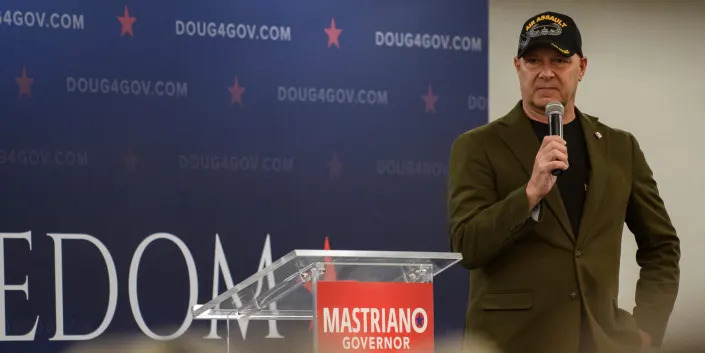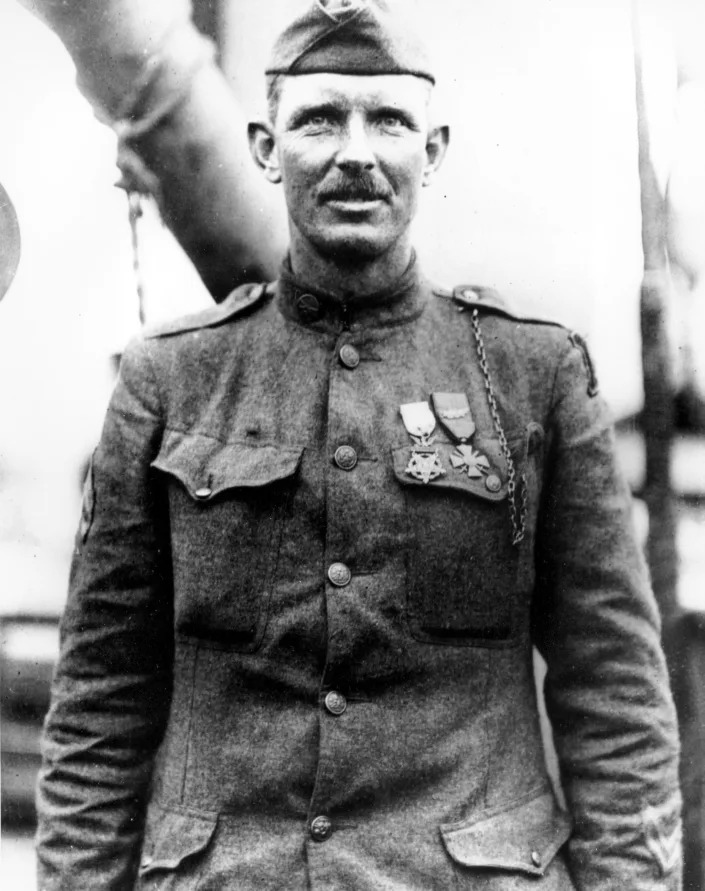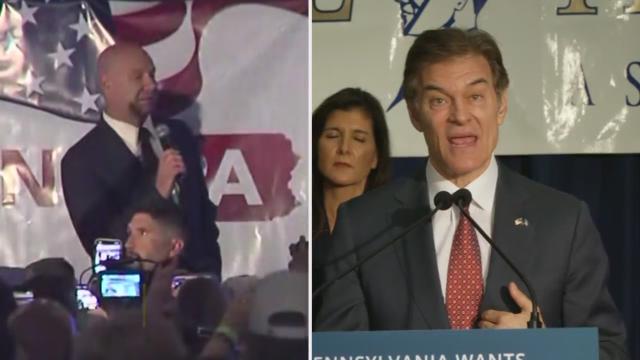Michigan GOP memo blames Tudor Dixon's performance for lost majorities
2022/11/11

Gretchen Whitmer on WXYZ Channel 7 at Oakland University on Oct. 24, 2022,
in Rochester, Michigan. - Robin Buckson/The Detroit News/TNS
Lansing, Mich. — A Thursday memo from Paul Cordes, the chief of staff for the Michigan Republican Party, blamed the party's historic midterm election losses on GOP gubernatorial candidate Tudor Dixon's performance and an internal power struggle.
On Tuesday, Michigan Democrats won majorities in the Michigan Legislature for the first time in 40 years. Democrats won 20 of the 38 seats in the Michigan Senate and 56 of the 110 seats in the state House.
Democratic Gov. Gretchen Whitmer captured a second term by 10 percentage points over Dixon, a first time candidate from Norton Shores.
Dixon under-performed other GOP candidates and failed to keep the governor's race close enough to give Republicans "a chance at keeping majorities in both chambers," Cordes wrote in his memo. Tudor's performance cost the party "around the edges in the close House and Senate races" and the GOP is "out of majorities because of it," Cordes contended.
"Tudor's efforts focused largely on Republican red meat issues, in hopes of inspiring a 2020-like showing at the polls," Cordes added. "There were more ads on transgender sports than inflation, gas prices and bread and butter issues that could have swayed independent voters.
"We did not have a turn out problem — middle-of-the-road voters simply didn't like what Tudor was selling."
Dixon, a former political commentator, fired back on social media Thursday night, saying the memo was "the perfect example" of what is wrong with the Michigan Republican Party. She said the issue with the party is the leadership of Chairman Ron Weiser, Co-Chairwoman Meshawn Maddock and Cordes.
"It's easy to come out and point fingers now, but the truth is they fought against me every step of the way and put the entire ticket at risk," Dixon said. "We need fresh leadership at the @MIGOP or Republicans will never have a voice in Michigan again."
Cordes fired right back late Thursday. In a statement, Cordes said Dixon's tweets were "a clear lie." "We turned out more Republicans than in previous midterm elections," Cordes said. "I'm struggling to find what parts of the memo, based on data from this past Tuesday, she's struggling with. Our memo speaks for itself."
The back-and-forth came two days after the Michigan Republican Party's losses on Election Day. It also occurred ahead of an expected fight about the next chair of the party.
Cordes said in his memo that Dixon had "almost no cash on hand" after winning the Aug. 2 primary and faced "millions of dollars in unanswered advertisements" using her own words on the subject of abortion.
The Republican nominee opposed abortion, including in cases involving rape and incest, as a proposal to enshrine abortion rights in the state Constitution was on the ballot. Most of Dixon's primary opponents held the same view except for Metro Detroit businessman Kevin Rinke, who said he supported exceptions for incest and rape.
Voters viewed "Tudor and Proposal 3 as a package deal" at the polls, Cordes wrote.
"Because of that, there was likely never any real chance at defeating what is truly one of the most evil and extreme constitutional amendments ever put before voters," Cordes said.
Proposal 3 passed with 57% support on Tuesday.
Cordes also touched on former President Donald Trump, who had endorsed Dixon, attorney general candidate Matt DePerno and secretary of state candidate Kristina Karamo.
"In what many of them saw as sending a message to Donald Trump and his supporters, longtime donors to the party remained on the sidelines despite constant warnings of the possibility of the outcome we saw come to fruition on Election Day: A statewide sweep and one-party Democratic rule in Lansing, something that has not been seen in nearly 40 years in Michigan," Cordes said.
"Countless hours spent courting donors consistently shifted into back and forths about Mar-a-Lago's influence over our process, party and voters," Cordes said. "All while Democrats raised tens of millions of dollars and invested record amounts statewide and in legislative districts."
High-quality, substantive candidates and well-funded campaigns are critical to winning elections, Cordes wrote.
"We struggled in both regards to the detriment of Michiganders across the state," he said.
© The Detroit News
How Doug Mastriano’s run for Pa. governor veered far off course
2022/11/11

Pennsylvania Republican gubernatorial candidate Doug Mastriano speaks during a rally featuring former President Donald Trump at the Arnold Palmer Regional Airport on Nov. 5, 2022, in Latrobe, Pennsylvania. - Win McNamee/Getty Images North America/TNS
DONEGAL, Pa. — Last week here in Westmoreland County, hours before Donald Trump flew in to rally voters for Doug Mastriano, a woman was doing yard work beside a lawn sign on Route 31 that read: “Elect Jesus for Eternal Life.”
Mastriano had presented himself as the next-best candidate — a retired Army colonel turned Republican state senator on a self-described divine mission to shatter the wall between church and state as Pennsylvania’s next governor.
Months earlier, at a far-right Christian conference called “Patriots Arise for God and Country,” where QAnon and 9/11 conspiracy theories were discussed, Mastriano had assured attendees he’d be elected.
“My God will make it so,” he said.
Somewhere along the campaign trail, his triumph veered off-course.
Mastriano not only lost Tuesday’s election, he was trounced — despite a midterm political environment that should have been favorable to Republicans.
Unofficial results on Thursday had Democrat Josh Shapiro, the state’s attorney general, ahead of Mastriano by 56% to 42%, or about 748,000 votes.
Mastriano’s slogan was “walk as free people.” Whether he knew it or not, he was quickly running behind.
He emerged victorious from the GOP primary, but an opposition research apparatus dismantled his low-budget campaign. It could become a textbook example of how not to run for statewide office in Pennsylvania.
“He made it very easy,” said Alexandra De Luca, a strategist with American Bridge 21st Century, a progressive group that closely tracked Mastriano’s activities, online and off. He left a trove of damaging material online, some of which became fodder for attack ads.
“It’s like he didn’t even know he was running from behind, like if he prayed and fasted enough, he would win,” she said. “But that’s not how elections work.”
At first, there were signs that some establishment Republicans might be rallying to Mastriano’s side.
Andy Reilly, a Republican national committeeman from Delaware County, hosted a Mastriano fund-raiser in July. Reilly, who had previously been involved in a failed behind-the-scenes plan to block Mastriano from securing the GOP nomination in May, urged his fellow Republicans to “take a second look” at the candidate.
Many of them didn’t like what they saw.
Mastriano failed to raise much money, connect with moderate voters, or even convince the Republican Governors Association he was a viable candidate.
By September, he was campaigning with a right-wing evangelist named Lance Wallnau who had previously sold $45 Trump “prayer coins” and believed that President Joe Biden is the “Antichrist” and COVID-19 vaccines are used for “surveillance under the skin.”
The following week, Mastriano announced a plan that involved“40 days of fasting & prayer.”
He often referenced his military history and questioned Shapiro’s masculinity — “See you in Manheim if you’re man enough,” Mastriano tweeted at his opponent last month — but the Republican seemed uncomfortable associating with anyone but his most loyal supporters. Even though he didn’t have enough money to compete with Shapiro on TV, he also wouldn’t agree to a debate unless the campaigns could select the moderators. Mastriano believed a traditional format with an independent moderator was a “trap” for him.
At his campaign events, reporters were warned “not to engage with Doug or Rebbie,” as if Mastriano and his wife were exotic zoo animals best observed from a distance. Staffers even escorted some journalists to the bathroom to prevent them from being unsupervised inside the building, according to one reporter.
Mastriano was great at speaking to his fans, many of whom first heard of him through his fireside chats on Facebook Live during the 2020 coronavirus lockdowns. He was not so good at listening, and showed little interest in the exchange of ideas common in American democracy. One of his digital ads, ironically, featured stock footage from Russian propaganda, and a four-minute fund-raising request used footage from Russia, Poland and Belarus.
“I think they got a little too cocky,” said Jennifer Cohn, an attorney and columnist for the Bucks County Beacon, a progressive publication that reported extensively on Mastriano’s ties to Christian nationalist figures.
“(Mastriano) is truly a religious fanatic and is supported by religious fanatics,” Cohn said, referring to Wallnau and others affiliated with the far-right New Apostolic Reformation movement and Seven Mountains Dominionism, which holds that Christians should take control of seven secular “mountains” — including the government.
“People (who watched videos of their events) for the most part were horrified,” she said. “The NAR fanatics weren’t hiding it anymore. It backfired.”
By late October, even some of Mastriano’s political patrons had thrown up their hands in frustration.
Former Sen. Rick Santorum, a fellow conservative Republican who had campaigned with Mastriano, told a radio host that Mastriano had insisted on running a “covert campaign” that was destined to fail.
De Luca and her staff, meanwhile, were repeatedly perplexed by the amateurish nature of Mastriano’s campaign.
“They were trying to run this race as an under-the-radar state Senate race,” she said, adding that Mastriano likely dragged down Mehmet Oz, the Republican Senate candidate, who lost to Democrat John Fetterman.
Still, Mastriano refused to change course. He appeared convinced that an endorsement from Trump and a blessing from God was enough to defeat Shapiro.
But when Trump’s plane touched down at the Arnold Palmer Regional Airport in Latrobe last week, the former president walked to the lectern and spoke for about an hour — mostly about himself — before calling Mastriano up to the stage.
By that point, the crowd was already starting to thin.
On Tuesday night at the Penn Harris Hotel, as the clock approached midnight and television networks began calling the race for Shapiro, Mastriano’s wife held out hope, asking supporters gathered in the ballroom to pray “for the Lord to intervene.”
“Father, as we wait, we just don’t sit and wait, but we wait in expectation,” she said. “We wait in expectation of what you have, Father.”
“Amen!” people in the crowd shouted in unison.
Soon, journalists started packing up their gear. Supporters began leaving.
Mastriano chatted with a small group in a far corner of the room, as the DJ played Rick Astley’s “Never Gonna Give You Up.” It was as sure a sign as any that no intervention would be forthcoming.
And yet.
In a Tuesday morning interview, Chris Stigall, a conservative radio host, asked Mastriano, if he lost, “Where do you go next?”
Mastriano said he would not even brook the possibility of defeat. Nor did he concede on Wednesday.
“You know, we’re going to win,” he said. “I just don’t see how we can’t with the lack of enthusiasm on the other side.”
Staff writer Chris Brennan contributed to this article.
____
© The Philadelphia Inquirer
















